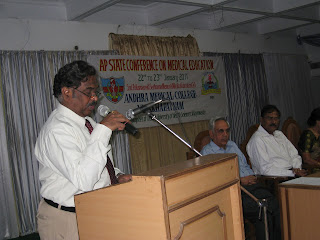The two day State Conference on Medical Education set off to an auspicious start with the inauguration of the Pre Conference CME (Continuing Medical Education) Program on 22nd January 2011 Saturday by the Director of Medical Education (Academic) Dr.M.V.Ramanamma. it was a pleasant coincidence for the M.E.Cell which was celebrating its 16th anniversary on the day. Speaking on the occasion, the DME stressed the need for a re-look at the existing medical curriculum so that the doctor who passes out is well equipped to provide quality health care to the people.
There was a lively panel discussion on Rural Health Care & Medical Education where the panelists, after discussion from the floor, reached a consensus that there was a need to provide some permanent rural health care delivery system that would work effectively and not just remain on paper; they also were wary of the 3 year proposed Bachelor’s Course on Rural Health Care (BRHC) and concluded that a policy of incentives, like reservation of PG seats for those who work in rural areas, and, enforcing compulsory rural postings for MBBS doctors as well as PGs without any political interference, would be an effective strategy to meet the health demands of the rural people. The panel included Drs. B.Subba Rao (neurosurgeon), N.Ananthakrishnan (surgeon & educationist from Puducherry who also gave a short talk on the proposed BRHC course), K.Rama Sankaram (community medicine), G.Santa Rao (Superintendent, KGH) and Rajekar (PG) and Archana (intern).
Dr.G.Bhagya Rao, Principal, AMC who presided over the inaugural function, later spoke on stress management for doctors. Two lectures aroused the interests of the over 250 delegates who attended the conference – one on newer Teaching Learning Methods & Media by Dr.PV Chalam from Hyderabad who spoke on e-learning, m-learning, skill labs, etc. and the other on newer Evaluation methods by NTR University of Health Sciences Registrar Dr.T.Venugopala Rao, who underscored the need for competency based evaluation and methods such as 360 degree assessment and portfolio based assessment. Dr.K.Venkateswarulu, Vice Principal, gave an account of the history of faculty development in medical education in India. Earlier Dwarakanath, Chairperson of the Medical Education Cell presented the MCI’s proposal for a new graduate medical curriculum.
The highlight of the evening were the paper presentations – there were about 15 papers presented by doctors from all over the state. Opinion papers were presented by Drs.Vijay Sekhar, Rajasekhar, Vijay Bhushan and Devi Madhavi.
The Department of Community Medicine had a rich prize haul among the free paper session - the first prize was awarded to Dr.Helena for her work on Perception of medical students on teaching aids while the second prize was shared by two PGs – Lakshmi Prasad (attitude of students towards medical research) and Siva Kumar (perceptions of students towards evaluation) along with B Anuradha (Microbioogy Khammam) for her work on slow learners.
The second day of the AP State Conference on Medical Education saw the inauguration of the Symposium on PG Education by the Honorable Vice Chancellor of Dr.NTRUHS Dr.I.V.Rao. Speaking on the occasion, the new incumbent promised to work towards producing efficient and competent doctors. He unveiled a new and ambitious University program to conduct CME Programs for all PGs all over the state in medical colleges every month wherein they can listen to guest lectures by eminent speakers. He stressed the University’s motto to modernize medical education through conducting regular faculty development programs, establishing clinical skill labs in all medical colleges and ensuring transparency and discipline in assessment methods. Addressing all the principals in the state, on the sidelines of the conference, he urged them to ensure regular attendance and development of professional knowledge and skills among all postgraduates. He sought their full involvement and cooperation in conducting the monthly CME Programs which would be costing the University exchequer more than 50 lakh rupees a year.
Dr.Ananthakrishnan medical educationist from Puducherry, who had headed the MCI panel on Restructuring the PG medical courses, spoke of the MCI’s Vision 2025 document to revamp the PG courses. He envisaged a totally new PG program offering multiple opportunities to the PGs to diversify into education, research, hospital management, bioengineering, which would serve the country’s health needs as well as student expectations.
However, the house had several doubts about the new courses. Dr.IV Rao summed it up well when he said that Andhra Pradesh did not fare badly on the health or medical education front as is seen in some northern states. He attributed this to several Government measures such as reservation of PG seats for those who work in rural areas, thus ensuring that doctors work in PHCs, and, also ensuring a sufficient teaching faculty pool. Further the Arogyasri scheme, he said, helped private colleges to get sufficient patients to train their students.
Other guest lectures included Newer & need based PG course by Dr.MV Ramanamma, Director of Medical Education, Evaluation of the PG Dissertation by Dr.Jyothi Padmaja and Soft Skills for Doctors by Prof. Prasanna Kumar, former Rector of AU. The conference concluded with a panel discussion on Reforms in PG Evaluation moderated by Dr.Krishna Babu and included several of the guest speakers besides Dr.Mohan Rao (Ophthtalmology) Dr.Kalpana (Biochemistry) and Ravi Sankar (PG). The panel and some members of the house made several suggestions to reorient the PG evaluation to the professional needs of the students and make the evaluation system more reliable, unbiased and valid, thereby also reducing the exam stress on the PGs. Prizes were presented to the award winners of the Free paper sessions- Drs. Helena, Lakshmi Prasad, Siva Kumar (PGs in Community Medicine) and Dr.Anuradha from Khammam.
****************************







